The EAHP EU Monitor is a regular round up of news relevant to hospital pharmacy in Europe.
Contribute to the future crisis preparedness of hospital pharmacies!
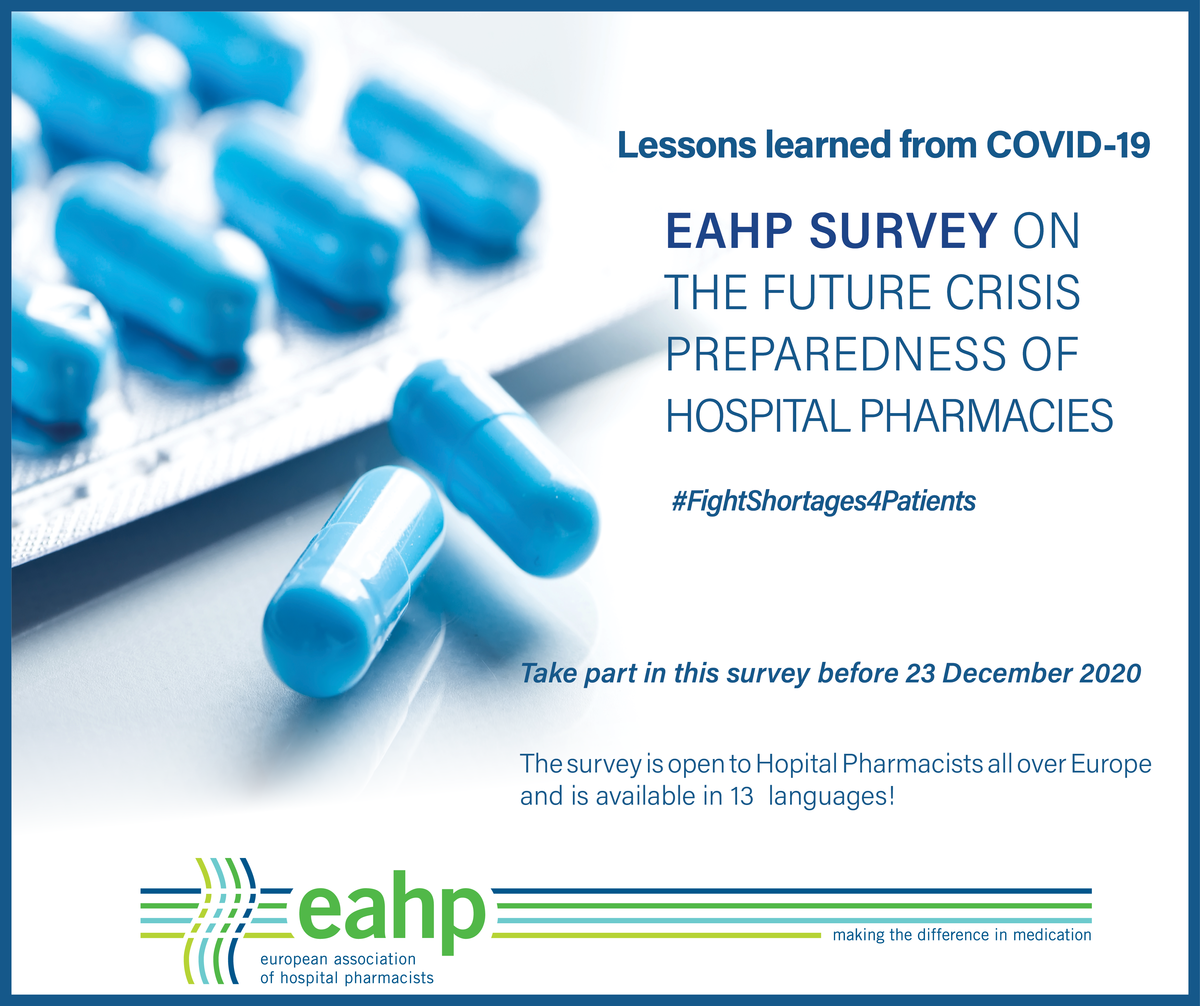 In mid-September, the European Association of Hospital Pharmacists (EAHP) launched a survey on the future crisis preparedness of hospital pharmacies which seeks to collect information on the lessons learned from the COVID-19 pandemic. Hospital pharmacists from across Europe are encouraged to share their views by 23 December 2020.
In mid-September, the European Association of Hospital Pharmacists (EAHP) launched a survey on the future crisis preparedness of hospital pharmacies which seeks to collect information on the lessons learned from the COVID-19 pandemic. Hospital pharmacists from across Europe are encouraged to share their views by 23 December 2020.
EAHP’s survey tries to gather, on the one hand, details on the medicines for which shortages were experienced and on the other hand, it takes stock of the experiences made in hospitals during the pandemic. To better understand the impact on the profession and to put forward recommendations the survey also explores suggestions for improving the future crisis preparedness of hospital pharmacies. 13 different language versions have been made available to ensure wide participation. In case you have not yet submitted your contribution you still have 5 weeks to do so!
Access the English version HERE
Access the French version HERE
Access the German version HERE
Access the Greek version HERE
Access the Hungarian version HERE
Access the Italian version HERE
Access the Macedonian version HERE
Access the Montenegrin version HERE
Access the Portuguese version HERE
Access the Romanian version HERE
Access the Serbian version HERE
Access the Slovakian version HERE
Access the Spanish version HERE
Celebrate the European Antibiotic Awareness Day!
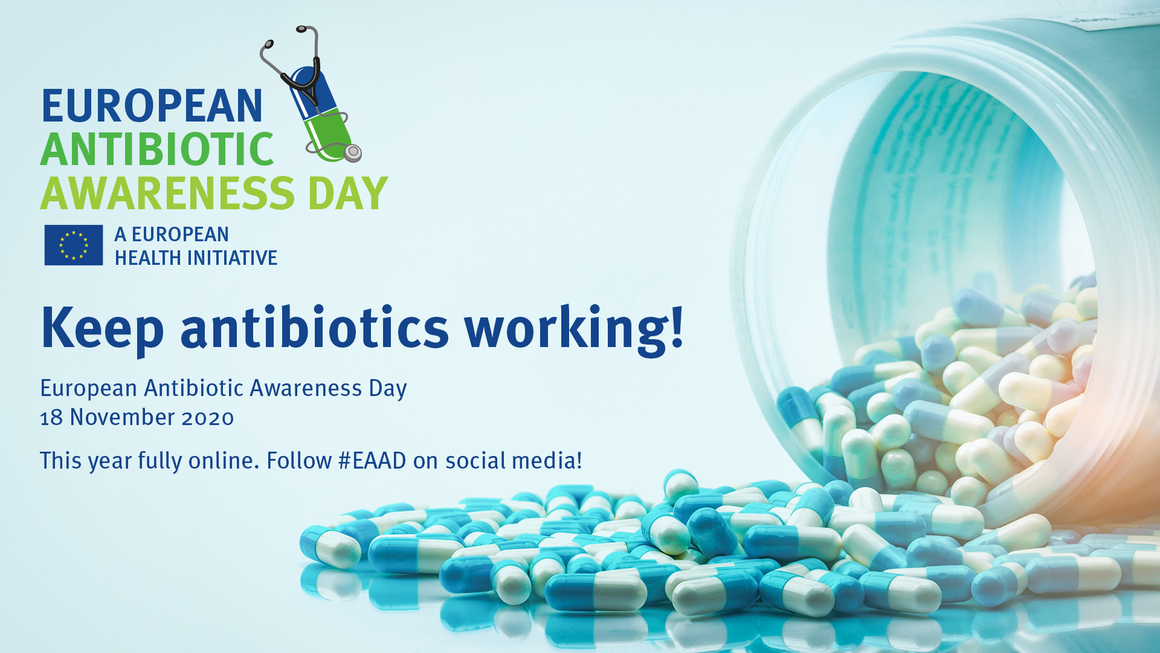 Tomorrow the European Union will be celebrating the European Antibiotic Awareness Day (EAAD). This year’s edition will be held fully online. Pharmacists, doctors, nurses, hospital managers, farmers, veterinarians, policymakers, professional and patient organisations, governmental institutions, and the general public are encouraged to share how they #KeepAntibioticsWorking.
Tomorrow the European Union will be celebrating the European Antibiotic Awareness Day (EAAD). This year’s edition will be held fully online. Pharmacists, doctors, nurses, hospital managers, farmers, veterinarians, policymakers, professional and patient organisations, governmental institutions, and the general public are encouraged to share how they #KeepAntibioticsWorking.
Like every year, the EAAD falls within the WAAW which has seen a name change to “World Antimicrobial Awareness Week”. The World Health Organization (WHO) decided to switch from “antibiotics” to the more encompassing and inclusive term “antimicrobials”, which covers antibiotic, antiviral, antifungal and antiprotozoal medicines. Multiple factors – including overuse of medicines in humans, livestock, and agriculture, as well as poor access to clean water, sanitation and hygiene – have accelerated the threat of antimicrobial resistance worldwide. The theme of the WAAW in 2020, that is running from 18 to 24 November, is “United to preserve antimicrobials”.
As part of the EAAD, healthcare professionals are invited to join the global Twitter storm on 18 November at 2 PM CET. By tweeting about #AntibioticResistance and #WAAW you can help to raise awareness of the issue. If you wish to participate, make sure to post this through your Twitter account at that time or during the day, together with hashtags that are relevant for you.
Learn more about EAAD HERE
Learn more about WAAW HERE
Follow EAHP via Twitter, Facebook Instagram and LinkedIn during EAAD and WAAW!
Moving towards a European Health Union
 Last week, the European Commission announced its plans for a European Health Union to better protect the health of its citizens and improve collective responses to cross-border health crises such as the COVID-19 pandemic. The proposals put forward will help the EU to better respond to Member States’ needs and to build a strong and resilient Europe Health Union that can withstand other health threats in the future.
Last week, the European Commission announced its plans for a European Health Union to better protect the health of its citizens and improve collective responses to cross-border health crises such as the COVID-19 pandemic. The proposals put forward will help the EU to better respond to Member States’ needs and to build a strong and resilient Europe Health Union that can withstand other health threats in the future.
The proposals – which take into account the lessons learned from COVID-19 – focus on revamping the existing legal framework for serious cross-border threats to health as well as reinforcing the crisis preparedness and common coordination by strengthening the roles of two key EU agencies, the European Centre for Disease Prevention and Control (ECDC) and the European Medicines Agency (EMA). With greater support, the ECDC can help increase capacities for preparedness, surveillance, early warning, and risk assessment, while an enhanced EMA can help address the vulnerability in the supply chains for both medical products and medicines by better monitoring and mitigating these situations.
Other issues like medicines shortages that worsened during the pandemic and the affordability of medical countermeasures such as vaccines and therapies will be addressed by the EU’s new pharmaceutical strategy which is expected to be published next week.
Learn more about the proposals for a European Health Union HERE
EU-JAMRAI launches its first Antibiotic Resistance Symbol
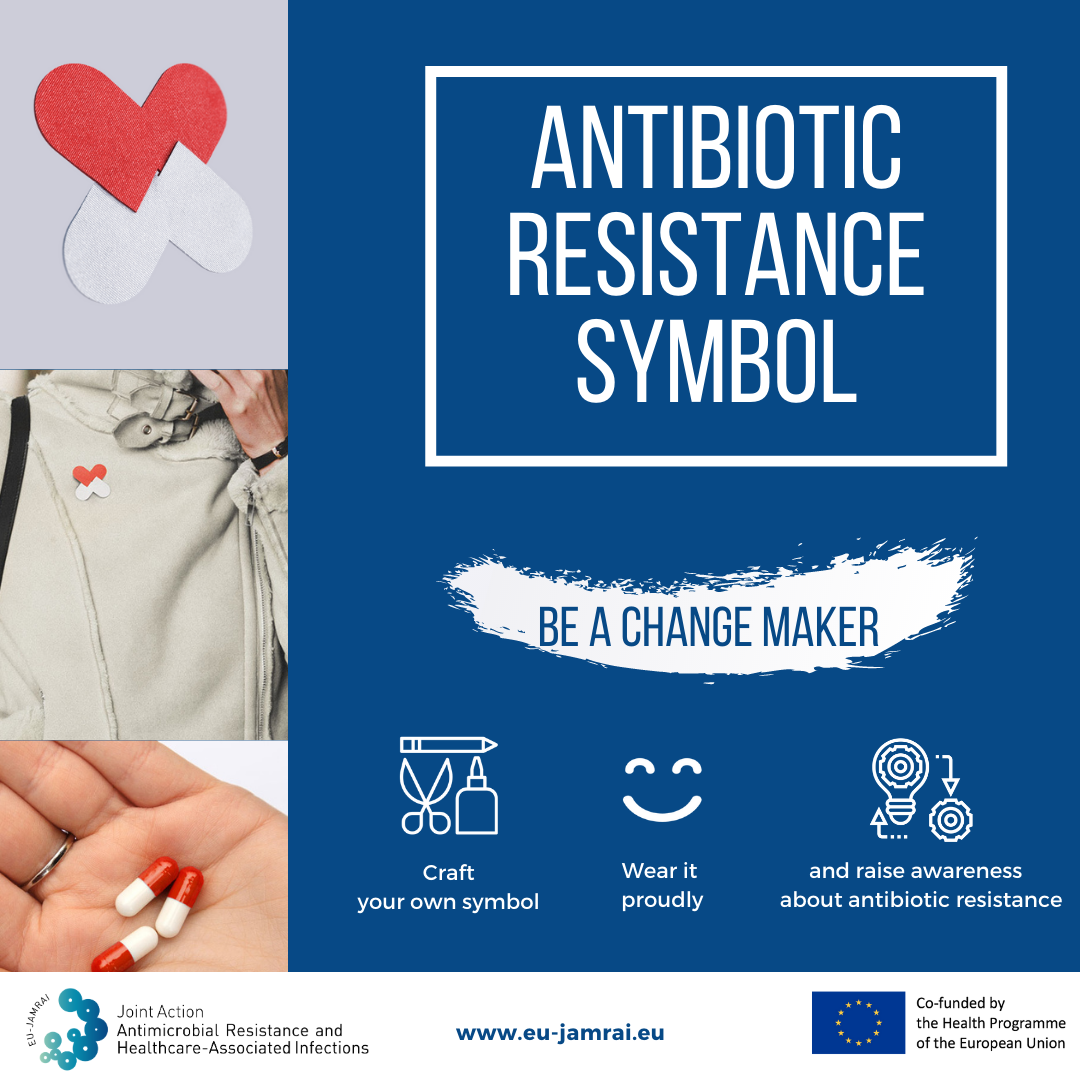 Last year, on the occasion of the celebration of the EAAD, the Joint Action on Antimicrobial Resistance and Healthcare-Associated Infections (EU-JAMRAI) launched a design contest to find a symbol of the threat against antibiotic resistance. With the new symbol, EU-JAMRAI seeks to raise awareness of antimicrobial resistance, a great unknown to many people.
Last year, on the occasion of the celebration of the EAAD, the Joint Action on Antimicrobial Resistance and Healthcare-Associated Infections (EU-JAMRAI) launched a design contest to find a symbol of the threat against antibiotic resistance. With the new symbol, EU-JAMRAI seeks to raise awareness of antimicrobial resistance, a great unknown to many people.
After almost a year and 600 applications from 44 different countries, EU-JAMRAI announced last week the winning symbol. The symbol combines 2 capsules, 2 band-aids and 2 hearts. In addition, it is easy to make yourself and easy to recognize. Congratulations to Swedish designer David Ljungberg!
Find out HERE how to craft your symbol!
Webinar on the Council of Europe ‘Resolution on the implementation of pharmaceutical care’
 Earlier this year, the Committee of Ministers of the Council of Europe adopted a new Resolution “CM/Res(2020)3 on the implementation of pharmaceutical care for the benefit of patients and health services”. This resolution defines a framework for promoting and implementing the concept of pharmaceutical care in national health systems. A webinar will be organised by the European Directorate for the Quality of Medicines & HealthCare (EDQM) on 26 November at 3 PM CET to outline the content of this resolution.
Earlier this year, the Committee of Ministers of the Council of Europe adopted a new Resolution “CM/Res(2020)3 on the implementation of pharmaceutical care for the benefit of patients and health services”. This resolution defines a framework for promoting and implementing the concept of pharmaceutical care in national health systems. A webinar will be organised by the European Directorate for the Quality of Medicines & HealthCare (EDQM) on 26 November at 3 PM CET to outline the content of this resolution.
The webinar will explain the background to the resolution and how it can be used by policymakers and stakeholders. It will also cover the content of the resolution and its added value and provide some practical examples on its implementation in daily practice at national level. The one-hour event will also include a live Q&A session.
Learn more about EDQMs webinar and how to register HERE
#VaccinesWork – Social media toolkit for healthcare professionals
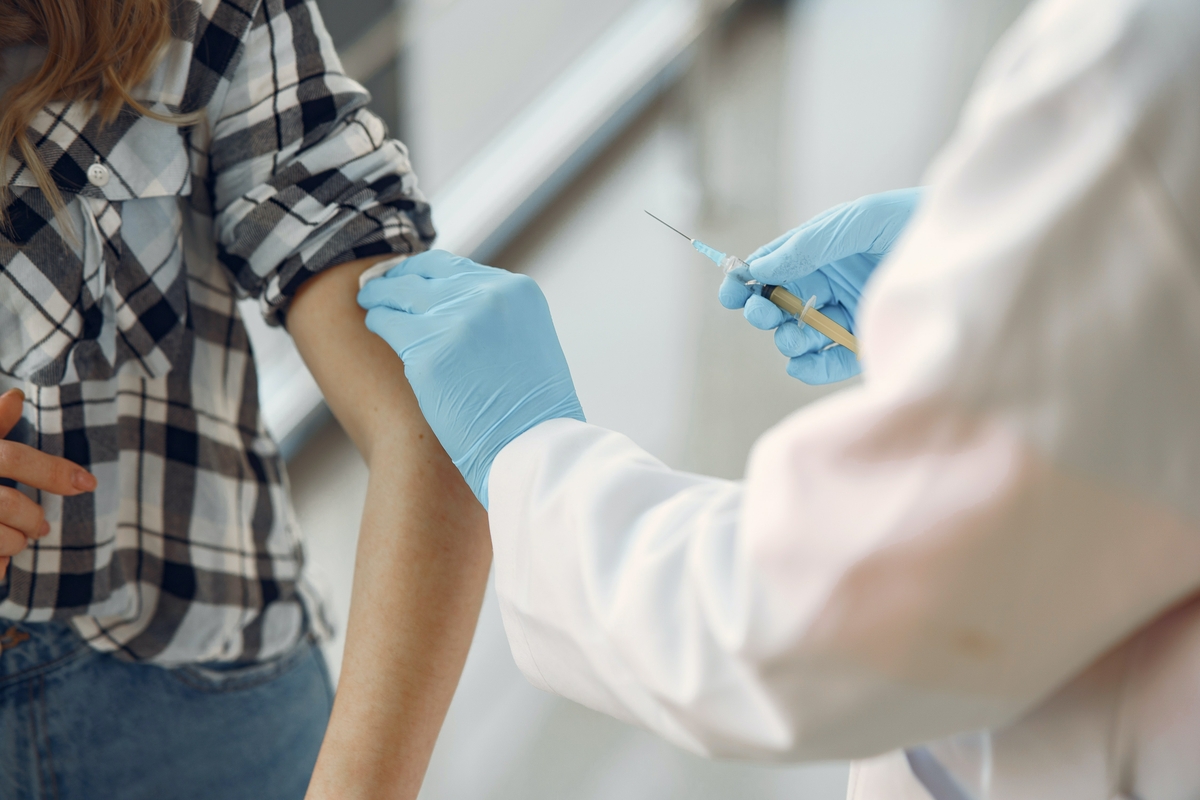 As part of the #VaccinesWork campaign, the European Commission has put together a social media toolkit which seeks to fight disinformation. The toolkit targets healthcare professionals since they play a key role in proving accurate information about vaccines.
As part of the #VaccinesWork campaign, the European Commission has put together a social media toolkit which seeks to fight disinformation. The toolkit targets healthcare professionals since they play a key role in proving accurate information about vaccines.
Vaccine hesitancy was identified by WHO as one of the top ten threats to global health. Consequently, the toolkit on “Spreading authoritative information online” tries to ensure that false narratives both in day-to-day interactions with patients and through activity on social media are countered by healthcare professionals. The document intends to guide them in that process. It lays out, in several steps, the proven approaches and strategies that can help react to this threat against vaccines and shift the narrative back towards science-based prevention.
Access the social media toolkit HERE
Questionnaire: Ward pharmacists in oncology – share your views!
 As announced previously, a member of the German Society of Hospital Pharmacists has put together a survey in order to demonstrate the benefits of a ward pharmacist in oncology and thus help to increase the patient’s therapeutic safety. In case you have not submitted your feedback, participation is still possible until mid-December
As announced previously, a member of the German Society of Hospital Pharmacists has put together a survey in order to demonstrate the benefits of a ward pharmacist in oncology and thus help to increase the patient’s therapeutic safety. In case you have not submitted your feedback, participation is still possible until mid-December
To assess the impact of possible improvements and to get the most comprehensive picture possible, it is necessary to determine the current situation throughout Europe. For representative data collection, only one answer from each hospital pharmacy is allowed. Your information will be handled strictly confidential and the results will only be published anonymously. Responses can be shared until 15 December 2020. Participation only takes a few minutes and aims also at supporting pharmacists in clinics without a cytostatics department.
Access the survey via the following LINK
EJHP: Deprescribing practices for anticonvulsants after benign seizures secondary to high-dose tranexamic acid in a single, large UK cardiothoracic centre
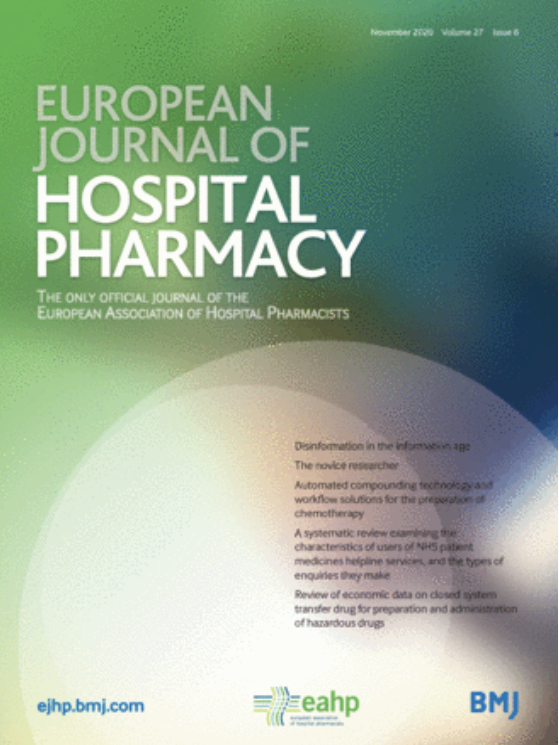
The original research published in the online first edition of the European Journal of Hospital Pharmacy (EJHP) aims to study if medication review in the hospital has led to deprescribing of anticonvulsants for TXA-associated seizures on discharge from the critical care unit (CCU) and hospital. The authors carried out a single-centre retrospective study conducted at a tertiary cardiothoracic hospital between 2012 and 2017. Based on their findings they concluded that deprescribing of anticonvulsants after benign seizures secondary to high-dose TXA is facilitated by a verbal and written handover, which can be improved in theirhospital.
Read the article HERE
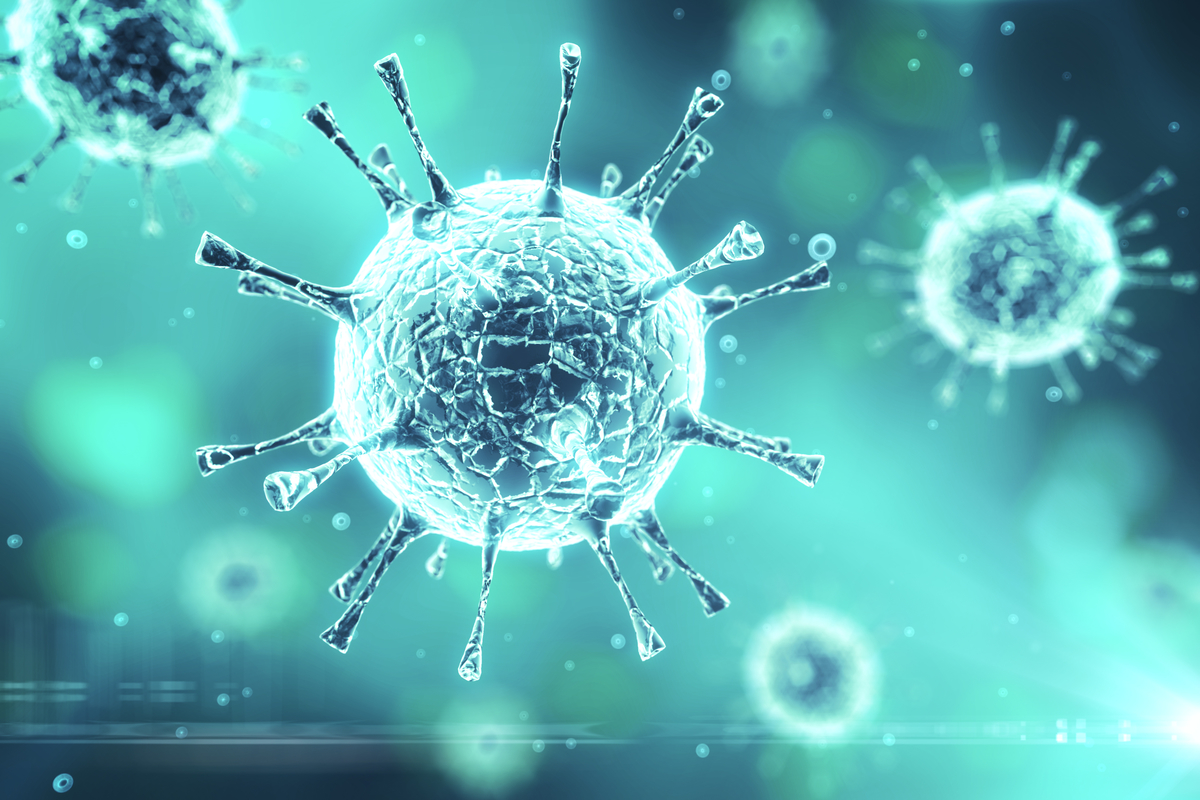 [COVID-19 Updates]
[COVID-19 Updates]
EAHP’s COVID-19 Resource Centre
To assist its member associations and individual hospital pharmacists in this critical time with the provision of the best possible care for patients, EAHP has decided to gather and make available information on COVID-19 relevant for the hospital pharmacy profession.
Access the Resource Centre HERE
WHO- PMNCH compendium of COVID-19 related partner resources on women’s, children’s and adolescents’ health
The Partnership for Maternal, Newborn & Child Health (PMNCH) published a compendium of COVID-19 related partner resources on women’s, children’s and adolescents’ health
Access the compendium HERE
British Society for Immunology – The ageing immune system and COVID-19
The report of BSI outlines five research recommendations to help increase our knowledge of the role played by the ageing immune system in the body’s response to COVID-19.
Read the report HERE
Research in Social and Administrative Pharmacy – The impact of COVID-19 on pharmacy transitions of care service
This paper highlights the important role pharmacists can play in providing effective communication, supporting continuity of care, and advocating for patient engagement and empowerment during transitions of care in the COVID-19 pandemic.
Read the article HERE
The European Statements of Hospital Pharmacy – EAHP’s SAT
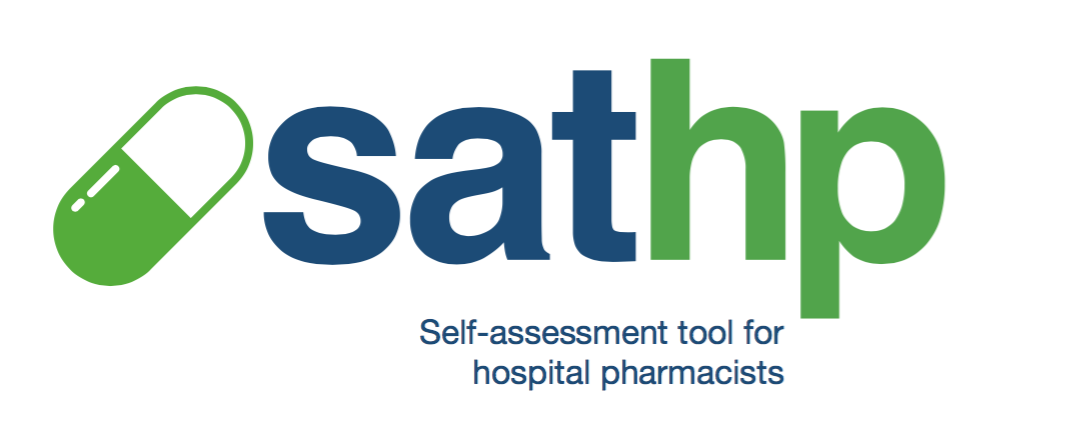
To help you with the implementation of the European Statements of Hospital Pharmacy, EAHP has developed a self-assessment tool (SAT) which helps you understand the level of Statement implementation in your pharmacy. EAHP has translated the SAT into 13 different languages (Czech, English, French, German, Greek, Hungarian, Italian, Polish, Portuguese, Romanian, Serbo-Croatian, Spanish and Turkish). Many hospitals have already used this tool to review their level of compliance and to work on the improvement of the level of Statement implementation in their hospital pharmacy. What are you waiting for? Assess your pharmacy here: https://sat.eahp.eu
___________________________________________________________________________________
Consultations
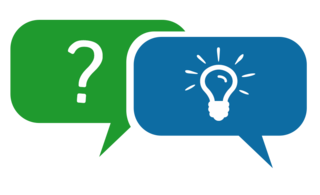
EMA – Guideline on registry-based studies
The guideline was developed based on the comments received on the discussion paper on ‘Methodological and operational considerations on the use of patient disease registries for regulatory purposes’, that went through a public consultation between November 2018 and June 2019, and a consultation of EMA Committees and Working parties.
Deadline – 31st December 2020
Access the consultation HERE
EDQM – Pharmeuropa PaedForm, Issue 2
The EDQM has just released issue 2 of Pharmeuropa PaedForm, in which the third monograph elaborated by the PaedForm Working Party, the draft text for an ethanol-free formulation for Furosemide 2 mg/mL Oral Solution, is published for public consultation prior to its inclusion in the European Paediatric Formulary.
Deadline – 31st December 2020
Find more information HERE























 In mid-September, the European Association of Hospital Pharmacists (EAHP) launched a survey on the future crisis preparedness of hospital pharmacies which seeks
In mid-September, the European Association of Hospital Pharmacists (EAHP) launched a survey on the future crisis preparedness of hospital pharmacies which seeks  Tomorrow the European Union will be celebrating the European Antibiotic Awareness Day (EAAD). This year’s edition will be held fully online. Pharmacists, doctors, nurses, hospital managers, farmers, veterinarians, policymakers, professional and patient organisations, governmental institutions, and the general public are encouraged to share how they #KeepAntibioticsWorking.
Tomorrow the European Union will be celebrating the European Antibiotic Awareness Day (EAAD). This year’s edition will be held fully online. Pharmacists, doctors, nurses, hospital managers, farmers, veterinarians, policymakers, professional and patient organisations, governmental institutions, and the general public are encouraged to share how they #KeepAntibioticsWorking.  Last week, the European Commission announced its plans for a European Health Union to better protect the health of its citizens and improve collective responses to cross-border health crises such as the COVID-19 pandemic. The proposals put forward will help the EU to better respond to Member States’ needs and to build a strong and resilient Europe Health Union that can withstand other health threats in the future.
Last week, the European Commission announced its plans for a European Health Union to better protect the health of its citizens and improve collective responses to cross-border health crises such as the COVID-19 pandemic. The proposals put forward will help the EU to better respond to Member States’ needs and to build a strong and resilient Europe Health Union that can withstand other health threats in the future. Last year, on the occasion of the celebration of the EAAD, the Joint Action on Antimicrobial Resistance and Healthcare-Associated Infections (EU-JAMRAI) launched a design contest to find a symbol of the threat against antibiotic resistance. With the new symbol, EU-JAMRAI seeks to raise awareness of antimicrobial resistance, a great unknown to many people.
Last year, on the occasion of the celebration of the EAAD, the Joint Action on Antimicrobial Resistance and Healthcare-Associated Infections (EU-JAMRAI) launched a design contest to find a symbol of the threat against antibiotic resistance. With the new symbol, EU-JAMRAI seeks to raise awareness of antimicrobial resistance, a great unknown to many people.  Earlier this year, the Committee of Ministers of the Council of Europe adopted a new Resolution “CM/Res(2020)3 on the implementation of pharmaceutical care for the benefit of patients and health services”. This resolution defines a framework for promoting and implementing the concept of pharmaceutical care in national health systems. A webinar will be organised by the European Directorate for the Quality of Medicines & HealthCare (EDQM) on 26 November at 3 PM CET to outline the content of this resolution.
Earlier this year, the Committee of Ministers of the Council of Europe adopted a new Resolution “CM/Res(2020)3 on the implementation of pharmaceutical care for the benefit of patients and health services”. This resolution defines a framework for promoting and implementing the concept of pharmaceutical care in national health systems. A webinar will be organised by the European Directorate for the Quality of Medicines & HealthCare (EDQM) on 26 November at 3 PM CET to outline the content of this resolution. As part of the #VaccinesWork campaign, the European Commission has put together a social media toolkit which seeks to fight disinformation. The toolkit targets healthcare professionals since they play a key role in proving accurate information about vaccines.
As part of the #VaccinesWork campaign, the European Commission has put together a social media toolkit which seeks to fight disinformation. The toolkit targets healthcare professionals since they play a key role in proving accurate information about vaccines.  As announced previously, a member of the German Society of Hospital Pharmacists has put together a survey in order to demonstrate the benefits of a ward pharmacist in oncology and thus help to increase the patient’s therapeutic safety. In case you have not submitted your feedback, participation is still possible until mid-December
As announced previously, a member of the German Society of Hospital Pharmacists has put together a survey in order to demonstrate the benefits of a ward pharmacist in oncology and thus help to increase the patient’s therapeutic safety. In case you have not submitted your feedback, participation is still possible until mid-December 
 [COVID-19 Updates]
[COVID-19 Updates]
